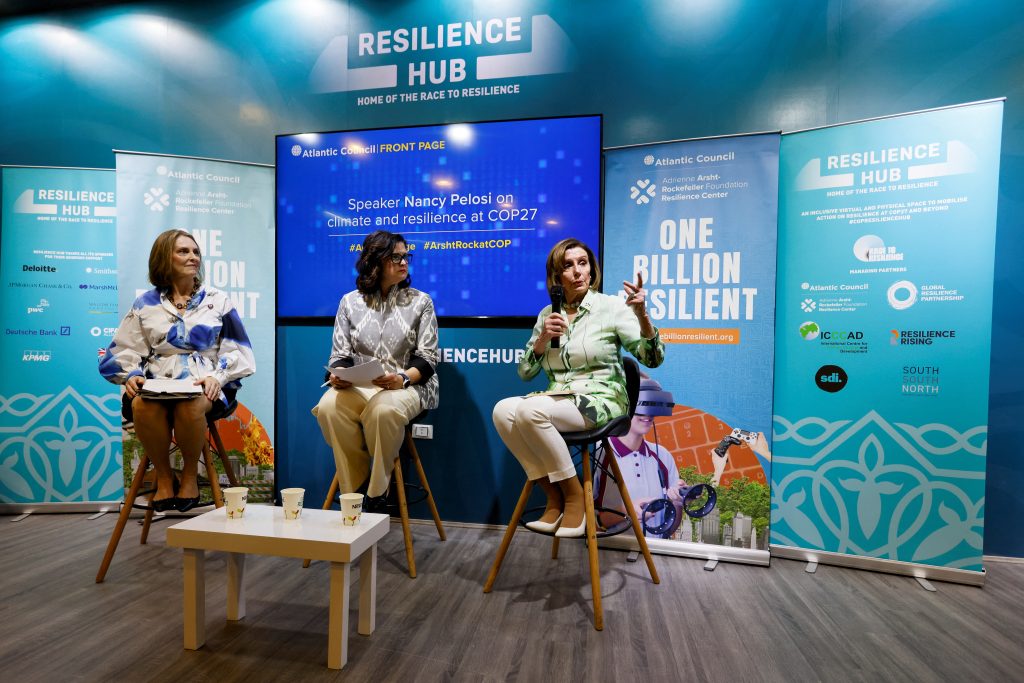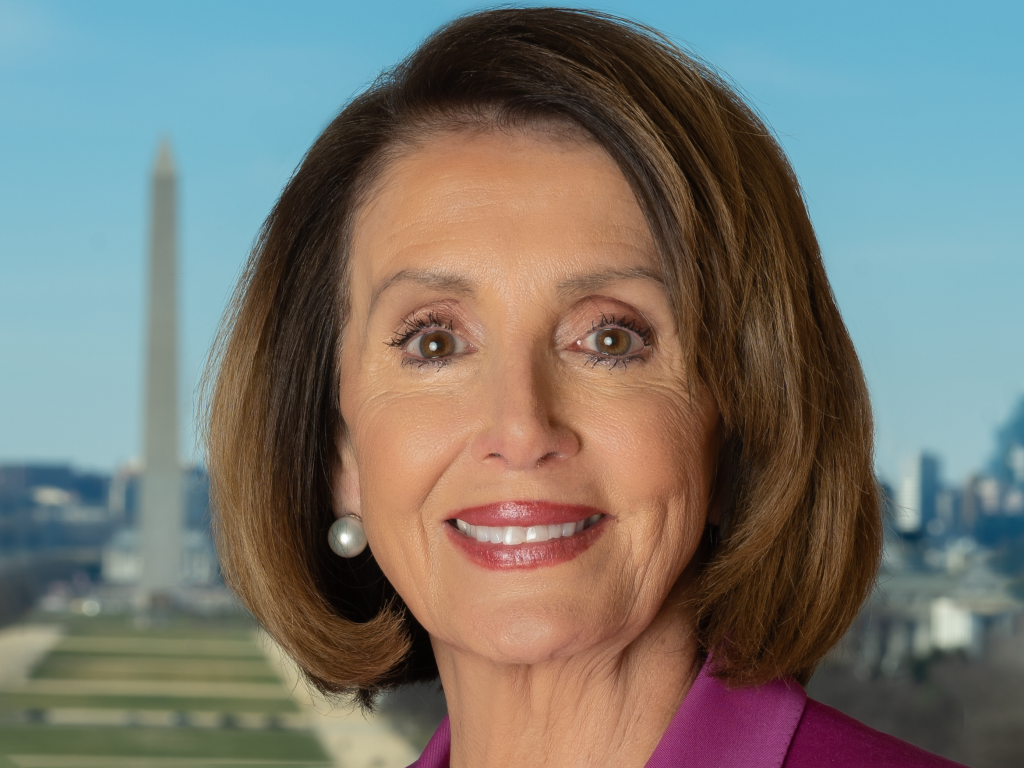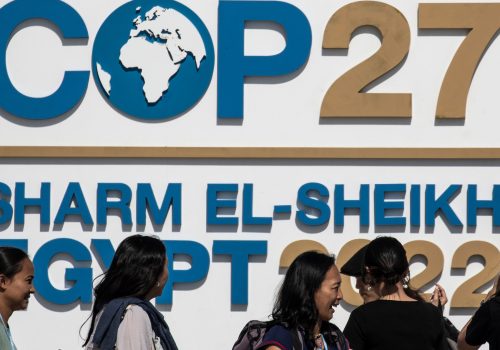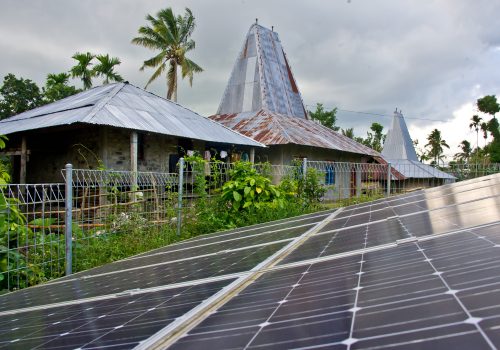Watch the full event
The United States is officially back “in the game,” leading the fight against climate change, said US Representative Kathy Castor, chair of the House Select Committee on the Climate Crisis. “And we’re not leaving the playing field ever again.”
Castor and House Speaker Nancy Pelosi spoke on Thursday about how the United States is addressing the climate crisis at an Atlantic Council Front Page event hosted by the Adrienne Arsht-Rockefeller Foundation Resilience Center at the United Nations Climate Change Conference of the Parties (COP27) in Sharm el Sheikh, Egypt.
While the United States—which withdrew from the Paris Climate Accords in 2019 but rejoined the agreement in 2021—has seen its climate leadership questioned, Castor said the country now has the tools to meet its emissions reduction goals. Those tools, she explained, include the bipartisan infrastructure law and the Inflation Reduction Act (IRA), the latter of which she deemed the “most important climate bill” in US history.
At COP27, Pelosi hopes that US and global leaders will “find common ground” to address climate change, especially because of how pervasive the effects will be on health, economies, and even security globally. “The competition for habitat and resources can cause conflict,” Pelosi noted. “We have to avoid that.”
Below are highlights from the event moderated by Kathy Baughman McLeod, senior vice president and director of Arsht-Rock:
Armed and ready
- Speaking as votes are still being tallied from Tuesday’s midterm elections, Pelosi, a Democrat, recalled how Republicans have called the climate crisis a “hoax.” “We have to get over that,” Pelosi said. If Republicans do take over the House of Representatives—the outcome was still up in the air as of Thursday with many races too close to call—they will “nix the climate committee,” Castor said.
- But with legislation to fight climate change in place, Castor said that the United States is arriving at COP27 with “not just talk anymore but with real concrete action.” At the convening, Castor said she hopes that allies and partners will see that the United States “is ready to participate in a much higher level through science, technology, resilience.”
- Castor pointed out that the United States has “cutting-edge science” at its disposal to assist in that participation. She recalled the infrastructure law’s and IRA’s investments in the National Aeronautics and Space Administration, which studies and tracks the planet’s changing climate, and the National Oceanic and Atmospheric Administration, which gathers data on climate change’s impacts and building resilience. Pelosi praised the agencies, saying “science… will get us to where we need to go,” to adapt to and mitigate climate change.
- Castor asked if the United States wasn’t going to lead on science and technology, “who is? We’re not willing to cede that to another country.” Pelosi agreed, saying that US leadership in science and technology “can be a resource to [other] countries.”
Resilience for all
- Pelosi explained that the IRA has a focus on “justice, fairness, inclusiveness, [and] diversity.” She added that the law provides sixty billion dollars strictly to “build infrastructure that unites communities.” She also pointed to an emphasis on STEM education across both laws that “enables everyone to participate” so that the country has access to the “best thinking” on climate change solutions “wherever it springs from.”
- Accessing the best thinking on climate change will also require “a commitment globally to the education of women,” Pelosi argued, because women bring “brainpower” and make a “big difference” in their communities. “We have to have a systemic way for that to happen” for women across the world, she explained. Castor pointed to research showing that improving access to education and family planning for young girls is “one of the clear climate solutions.”
- Pelosi noted that supporting women entering the workforce through child tax credits and family and medical leave will “enable women to be in the game” of developing climate solutions. The United States, Castor added, must work with its partners “around the globe to do better by girls and women, no matter where they live.”
What next?
- Now that the United States has passed an “historic” package of investments in climate solutions, Castor said that there’s “a whole lot more left to do,” especially for the private sector, which now needs to develop technology to adapt to and mitigate climate change. She explained that private companies will be able to leverage tools such as tax credits to develop clean-energy technologies.
- Pelosi noted that she’s seen companies shift to more green practices because “it’s a moneymaker” or it “honors their responsibility to their shareholders.” But she pointed out that they should be doing so because it is good for their stakeholders: “the community, their employees, [and] their customers.”
- In the end, Castor said, the government’s goal is to boost US technological capacity and then transfer it to the rest of the world, and especially to developing countries. For example, she said that “Africa wants to modernize and develop,” but countries there need to choose between powering that development with cheap, but destructive, coal and gas or with sustainable, clean energy. The United States leadership in the latter could help them “pivot,” Castor argued.
- From floods in Pakistan to hurricanes in her home state of Florida, “no one is immune to the cost of the growing risk of the climate crisis,” Castor said. And since the atmosphere is already full of greenhouse gases, there’s a bleak future ahead, she added, “unless we act now.”
Katherine Walla is an assistant director of editorial at the Atlantic Council.
Watch the full event
Further reading
Mon, Nov 7, 2022
Live updates from COP27 as leaders battle climate change amid global crises
New Atlanticist By
Are global leaders heeding this year's wake-up calls with bold commitments at COP27? Our experts give their takes.
Fri, Nov 4, 2022
Just Energy Transition Partnerships: Will COP27 deliver for emerging economies?
EnergySource By
The JETP model is poised to deliver results in South Africa. Now, at COP27 and beyond, the true test will be translating the model to other country contexts.
Thu, Sep 22, 2022
Egypt is hosting COP27. What are the expectations?
MENASource By Lama El Hatow
As the host country for the 2022 United Nations Climate Change Conference, Egypt has a huge role to play during its presidency of the event, as all eyes will be geared towards how the country can lead by example.
Image: US House Speaker Nancy Pelosi, Director of the Adrienne Arsht-Rockefeller Foundation Resilience Center Kathy Baughman McLeod, and House Select Committee on the Climate Crisis Chair Kathy Castor attend a discussion on how the United States and allies can bolster climate action and change the trajectory of global warming at COP27 climate summit, in Sharm el-Sheikh, Egypt, November 10, 2022. Photo by Emilie Madi/Reuters.




